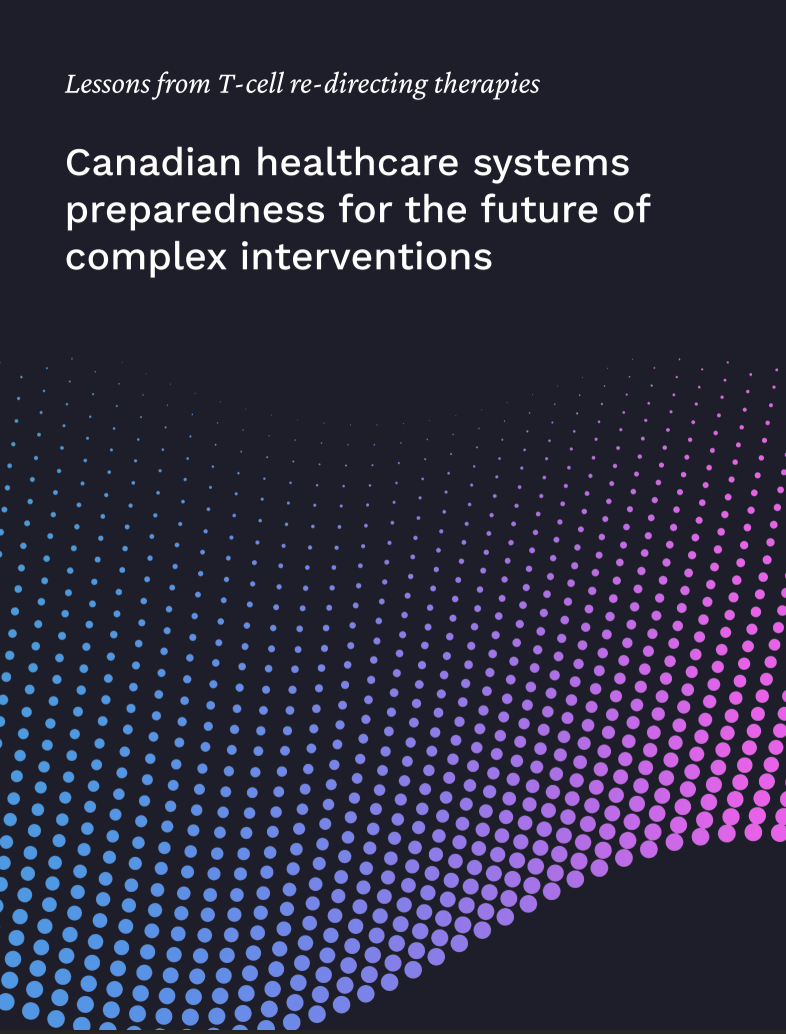10 Shared Objectives for a New Federal Government
With a new cabinet announced, the RHC is issuing a “Joint Mandate Letter” (JML) addressed to the Ministers of Health and Industry that lays out a core set of pivotal priorities vital to ensuring Canada’s health and wealth.
PARTNER PUBLICATION
Lessons from T-cell re-directing therapies: Canadian healthcare systems preparedness for the future of complex interventions
About the Resilient Healthcare Coalition
Formally launched in the Spring of 2021, the Resilient Healthcare Coalition (RHC) brings together a diverse group of health system leaders from industry, research, and advocacy groups across the public, private, and non-profit sectors. Our mission is to create Canadian healthcare systems that improve patient care and health outcomes by evolving to become faster, nimbler, and better able to absorb future shocks. With a focused agenda based on the collective insights of our members, the RHC unites a wide range of Canadian health system stakeholders committed to driving meaningful change.
Our mission is to create a health system that is faster, nimbler, and therefore better able to absorb shocks such as COVID-19. We do this by focusing on accomplishing two fundamental goals. First, optimizing the use of healthcare data to better-inform health care decisions. Second, expanding and accelerating patient access to innovative health technologies – from vaccines and diagnostics to therapeutics and medical devices.
A resilient system is better for governments, providers and researchers, and most importantly, better for patients.

Building Resilient Healthcare Systems for a Post-Crisis Era
The concept of health system resilience is neither a new one, nor an exclusively Canadian one. In fact, COVID-19 has not only supercharged a global policy discussion centred around how best to make healthcare systems less fragile, but also highlighted a constellation of multiple pre-existing challenges each made exponentially worse by the pandemic.
From testing and treatment delays for cancer patients, ballooning surgical wait times, and intensified mental health challenges across populations, to insufficient and antiquated supplies of personal protective equipment – the implications have been direct and indirect. Health leaders across Canada have been forced to not only confront a massive public health crisis, but also address significant system challenges.
Shared efforts to manage and mitigate this historic crisis are being fast-tracked, and a global conversation is emerging around the need to build more resilient healthcare systems. There is a call for systems to shift from a singular focus on cost containment to more comprehensive and holistic approaches. A commitment to improving patient outcomes through systemic and standardized measurement that enables systems to better predict and prevent disease, as well as harness new evidence-based innovations, is pertinent.
How We Work: Shifting from Fragility to Resilience
With the common goal of building a more resilient Canada, the Resilient Healthcare Coalition is engaging system leaders across the sector to:
Catalyze public-private-non-profit partnerships.
Accelerate and expand access to a wide range of transformative health technologies.
Optimize the collection, integration and analysis of healthcare data to better measure patient outcomes.
Create, scale and spread innovative models of patient care, with a particular focus on measuring and maximizing value for patients.
Showcase local leadership by highlighting homegrown successes – including ideas from governments, community leaders and academics.
Support the identification and integration of models and solutions from around the world.





